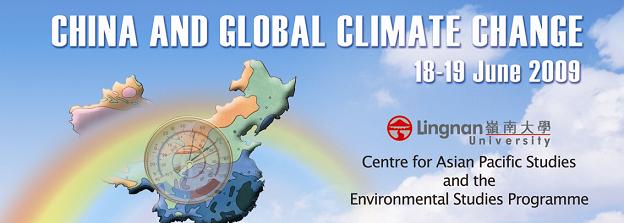
Event Title
Conference on China and Global Climate Change : Reconciling International Fairness and Protection of the Atmospheric Commons
Location
AM308, Lingnan University
Start Date
18-6-2009 9:45 AM
End Date
18-6-2009 10:30 AM
Language
English
Description
China’s unprecedented economic growth has given rise to equally rapid increases in greenhouse gas emissions. China has already ratified the Kyoto and Montreal Protocols, yet as the international community looks beyond Kyoto, China’s willingness to adhere to binding emissions standards remains a critical question. This study describes and analyzes the factors that influence China’s possible participation in a binding greenhouse gas emissions treaty. Existing international treaty compliance models often overlook China’s own official policies and stances toward such treaties. This study examines China’s current climate change policy, historical adjustments of that policy, and potential future trajectory to determine the factors that would most impact China’s willingness to sign a post-Kyoto climate change. This study utilizes both English and Chinese-language documents to analyze current Chinese climate change policies. It describes the historical trajectory of Chinese environmental policy since 1972, tracing the evolution of the “common but differentiated responsibilities” principle and of the demand for technology transfers and access to international funds. This study also examines reports from the World Bank, China Council for International Cooperation on Environment and Development (CCICED) and the Organisation for Economic Co-operation and Development (OECD), explicating how recommendations from influential organizations may impact China’s future policy trajectory. Most surprisingly, the conclusion of this study is that China, while retaining much of its former stance on climate change, is also increasingly warming to taking bold actions to reduce greenhouse gas emissions.
Document Type
Discussion
Recommended Citation
Gong, G. J. (2009). Getting hotter: How could China’s climate change policy trajectory impact a Post-Kyoto accord? In China and global climate change: Proceedings of the conference held at Lingnan University, Hong Kong, 18-19 June 2009 (pp. 38-60). Centre for Asian Pacific Studies and the Environmental Studies Programme, Lingnan University, Hong Kong.
Included in
Getting hotter : how could China’s climate change policy trajectory impact a Post-Kyoto accord?
AM308, Lingnan University
China’s unprecedented economic growth has given rise to equally rapid increases in greenhouse gas emissions. China has already ratified the Kyoto and Montreal Protocols, yet as the international community looks beyond Kyoto, China’s willingness to adhere to binding emissions standards remains a critical question. This study describes and analyzes the factors that influence China’s possible participation in a binding greenhouse gas emissions treaty. Existing international treaty compliance models often overlook China’s own official policies and stances toward such treaties. This study examines China’s current climate change policy, historical adjustments of that policy, and potential future trajectory to determine the factors that would most impact China’s willingness to sign a post-Kyoto climate change. This study utilizes both English and Chinese-language documents to analyze current Chinese climate change policies. It describes the historical trajectory of Chinese environmental policy since 1972, tracing the evolution of the “common but differentiated responsibilities” principle and of the demand for technology transfers and access to international funds. This study also examines reports from the World Bank, China Council for International Cooperation on Environment and Development (CCICED) and the Organisation for Economic Co-operation and Development (OECD), explicating how recommendations from influential organizations may impact China’s future policy trajectory. Most surprisingly, the conclusion of this study is that China, while retaining much of its former stance on climate change, is also increasingly warming to taking bold actions to reduce greenhouse gas emissions.

